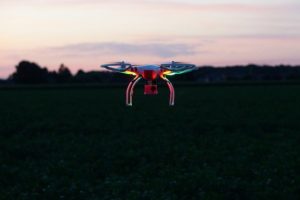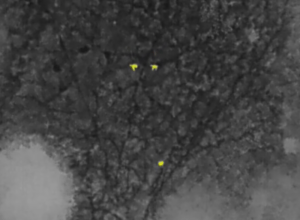 The latest rescue took place last month, when sherriff’s deputies found a missing 93-year-old woman in a dark field in Missouri – using a DJI drone with a thermal imaging camera. That brings the total to more than 500 lives saved by drones, according to DJI’s project counting the lives that would have been lost without direct intervention of drone technology.
The latest rescue took place last month, when sherriff’s deputies found a missing 93-year-old woman in a dark field in Missouri – using a DJI drone with a thermal imaging camera. That brings the total to more than 500 lives saved by drones, according to DJI’s project counting the lives that would have been lost without direct intervention of drone technology.
DJI began the project back in 2017 when they published a paper called “Lives Saved: A Survey of Drones in Action” which found that even back in 2016 – 2017, drones saved lives at the rate of nearly 1 per week. That first paper has evolved into the DJI Drone Rescue Map, which allows viewers to explore rescue incidents all over the world.
The project was started in response to bad press about drone technology. Research has shown that a negative drone event – even one that later is found to be inaccurate or untrue – averages more than 10x the publicity than a positive drone event. That’s a problem for a new industry struggling against negative public perception and fears over privacy issues and misuse of drone technology.
The rescue in Missouri was just the latest example of why inexpensive, off the shelf drones are a critical tool for police and public safety departments.
Thermal imaging released by the Cass County Sheriff’s Office shows how the drone spotted Chris Fairchild as a bright yellow dot in the darkness and guided deputies on the ground to her. “To see that little yellow dot, knowing that that’s the person you’re looking for, it feels great,” drone pilot Major Kevin Tieman told a local TV station. Fairchild was exhausted and had lost a shoe but was unharmed when she saw the drone overhead: “I kept saying, Come on, I’m here! Come on, I’m here!”
“A DJI drone is an amazing product and has allowed us to save lives. It is our responsibility to use all available technology and training to keep the citizens safe. The DJI Matrice 210 and thermal technology has done that,” Tieman said. The Sheriff’s Office acquired two DJI Mavic 2 Enterprise Dual drones this year, and four deputies are scheduled to start flight training this month.
“Just a few years ago, drones were an experimental technology for innovators in public safety, and civilians with drones often volunteered to help the professionals in emergencies,” said Romeo Durscher, DJI Senior Director of Public Safety Integration. “Today, public safety agencies across the world have adopted drones as a standard piece of equipment, and drones save people from peril every few days. It’s an astonishing success story for public safety, and for the people who are alive today because of drones.”
“With more than 500 people now rescued by drones operated under basic rules, we can see how reasonable regulations with low barriers to entry literally save lives, and how useful expanded drone operations at night and over people will be when they are permitted at scale,” said Brendan Schulman, DJI Vice President of Policy & Legal Affairs. “The successful use of drones in emergencies also starkly illustrates the crucial benefits to society that are placed in jeopardy when policy proposals seek to restrict or limit access to drone technology, or raise the costs of such equipment to public safety officials.”
DJI encourages public safety agencies to add their stories of drone rescues by submitting them using the form at the bottom of the map page. DJI asks anyone submitting information about a rescue to respect the privacy rights and expectations of the persons involved, and to not share any confidential or sensitive information about agency operations.

Miriam McNabb is the Editor-in-Chief of DRONELIFE and CEO of JobForDrones, a professional drone services marketplace, and a fascinated observer of the emerging drone industry and the regulatory environment for drones. Miriam has penned over 3,000 articles focused on the commercial drone space and is an international speaker and recognized figure in the industry. Miriam has a degree from the University of Chicago and over 20 years of experience in high tech sales and marketing for new technologies.
For drone industry consulting or writing, Email Miriam.
TWITTER:@spaldingbarker
Subscribe to DroneLife here.








Great article, Miriam! It’s amazing how drones like DJI are helping save lives and make a real difference in emergency situations.